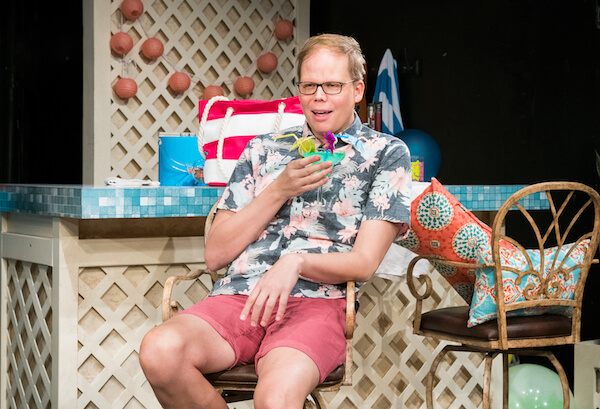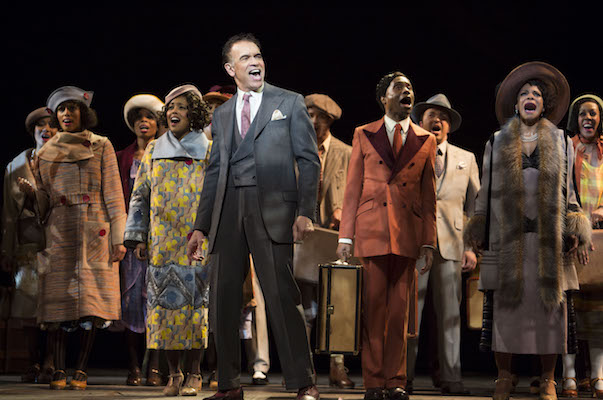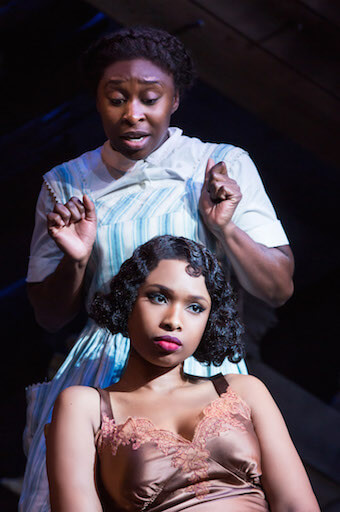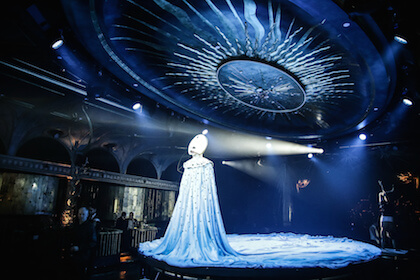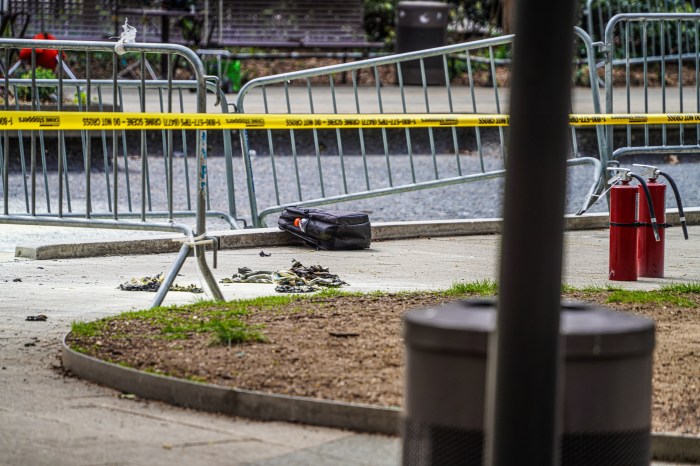Sutton Foster and Joel Perez, with Emily Padgett, Donald Jones, Jr., and Cody Williams (background) in Leigh Silverman’s production of “Sweet Charity” at the Linney Theatre through January 8. | MONIQUE CARBONI
For all its inherent, and inescapable, ebullience, the classic musical “Sweet Charity” has never been so nuanced and moving as in the stunning, stripped-down production now at The New Group. The story of a taxi dancer looking for love, constantly disappointed, and yet clinging relentlessly to her romantic ideals has usually been seen in productions emphasizing the leading lady’s song-and-dance bravura.
And why not?
With a terrific book by Neil Simon and one of Cy Coleman’s best, and most famous, scores with precise lyrics by Dorothy Fields as well as fond memories of both Gwen Verdon (on stage) and Shirley MacLaine (on film), this 50-year-old gem has always dazzled. Yet, it’s also remained somewhat emotionally distant, as if the bleak reality of Charity’s life was too grim for musical comedy. The audience was never really asked to consider Charity, or the show, as anything more than confectionary entertainment.
Three shows about challenging the script life has written
On a closer look, that’s fairly ironic, and Leigh Silverman’s production doesn’t let the audience off so easily. The result is revelatory. Mounted in a space seating a scant 230 people or so on a virtually bare stage, the scale imposes new intimacy and immediacy on the show. Would this have been possible 50 years ago? Perhaps not, but thanks to such serious recent musicals as “Fun Home” and “Here Lies Love,” the refusal to dodge the show’s more somber themes make this “Sweet Charity” bracingly contemporary.
There’s still plenty of classic show biz in this “Charity,” particularly with Sutton Foster in the role. Easily the most accomplished musical comedy actor of our time –– in terms of dancing, singing, and acting –– Foster shines from beginning to end in a perfectly calibrated performance that is definitive and exhilarating. Sure, her Charity bounces back from every setback with a pert smile and a high kick, but she also lets us see that this resilience comes at a cost. The comic moments are expertly realized –– and are richer juxtaposed against moments of subtle heartbreak that wouldn’t play as powerfully in a larger space.
The supporting company is outstanding, too. Joel Perez, fresh from his excellent work in “Fun Home,” plays four roles, delivers two show-stopping numbers, and demonstrates versatility and range that is beyond impressive. Shuler Hensley as Oscar, the guy Charity almost lands, is magnificent. Like Foster, he organically inhabits the character; he’s a real, feeling, and flawed person, who also lands every laugh.
Choreography has always been a huge component of “Sweet Charity,” and Joshua Bergasse’s work for the diminutive space is outstanding. He pays homage to Bob Fosse’s original style while creating new, intelligent, and vibrant movement consistent with the focus of the production. It’s doubly remarkable in such close quarters.
Clint Ramos’ take on the clothes of 1966, Jeff Croiter’s lighting, and especially Mary-Mitchell Campbell’s pared down orchestrations, played by an all-girl band, are all exceptional and critical to the success of the production.
Tickets for this limited run are, understandably, in short supply. You should go to any lengths to score them. Charity certainly would.
Jason Sudeikis (left) with Bubba Weiler, Thomas Mann, William Hochman and Cody Kostro in Tom Schulman’s “Dead Poets Society,” at Classic Stage Company through December 18 | JOAN MARCUS
I never saw the movie “Dead Poets Society,” so the play by Tom Schulman, who also wrote the screenplay, was completely new to me. The story is in the vein of post-World War II fiction about adolescents at boarding schools and owes a great debt to “A Separate Peace” and “A Catcher in the Rye,” or more recently “The Secret History,” among many others of that ilk. Thus, the story of teenage boys discovering themselves and challenging their parent-dictated life plans at the urging of John Keating, a charismatic and iconoclastic teacher, seems both familiar and hackneyed from the outset.
It quickly becomes obvious why the boys would be drawn to Keating and his message of carpe diem. Particularly in contrast to the stern, tradition-obsessed headmaster, Keating represents a different approach to life, one that specifically appeals to teenage boys struggling to develop identities and chafing at the strictures of school and parents. Inevitably, as the formula for this type of narrative goes, the boys pay a terrible price for their brief freedom, and Keating takes a fall. It’s all fairly bland, and Schulman has written types rather than characters so it’s difficult to engage in any emotional or substantive way.
Still, the play, now at Classic Stage and artfully staged by John Doyle does have a comfortable, lived-in sensibility that gives this production sufficient charm to create a benign, entertaining evening, with a few tugs at the heartstrings.
The principal appeal is the performance of Jason Sudeikis as Keating. His native warmth, charismatic mien, and wry humor are perfectly matched to the character, and it’s no surprise the boys would flock to — and want to emulate — him. Assigned their given types — shy, aggressive, hormonally rampant, and so forth — the actors deliver the goods, compensating for the lack in the writing with lots of youthful enthusiasm.
Unfortunately, buoyant as all that is, ultimately “Dead Poets Society” can’t overcome the sentimentality of this piece, and for all its good intentions, the lessons, such as they are, are lost.
Sahr Ngaujah, Leon Addison Brown, and Noah Robbins in Athol Fugard’s “Master Harold… And the Boys” at Signature Center through December 11 only. | MONIQUE CARBONI
The second half of “Master Harold… And the Boys” will have you on the edge of your seat. Unfortunately, the opening of Athol Fugard’s powerful story of race and relationships in South Africa in 1950 is freighted with exposition. Perhaps that’s necessary to establish the world of the play, but it seems forced.
The story concerns what goes on in a tearoom in the small town of Cape Elizabeth. The “boys” are Willie and Sam, two black men who work in the shop. Master Harold (known familiarly as Hally) is the son of the owner who spends his afternoons in the tearoom and, given an invalid father, is largely being parented by the two men. One day things explode. Hally, traumatized by his relationship with his father, lashes out at Sam and, in his upset, Hally’s assertion of superiority as a white man who is the owner’s son destroys the relationship Hally enjoyed with Willie and Sam. The play is a metaphor for the childishness of apartheid and the suffering it caused for all involved.
Under Fugard’s direction, once the conflict emerges, the production becomes both exciting and harrowing. Sam’s love for Hally and his desire to help the boy become more sensitive run headlong into Hally’s cultural programming. The racism that he has never expressed bubbles to the surface, and Sam is its target. Hally childishly displaces his rage at his father onto Sam in a racial outburst that is chilling, and it’s clear that aiming discontent in this way is the default in a culture built on master and servant roles.
The three men in the cast are all extraordinary. Sahr Ngaujah as Willie is the more passive of the men, but no less engaged. He serves an important role as a foil to Sam, who finally cannot suppress his own feelings of love and shame. As Sam, Leon Addison Brown gives the kind of integrated and passionate performance that is unforgettable. His final moments will break your heart, if he hasn’t done so previously. Noah Robbins as Hally is compelling as an unsettled and pained adolescent whose sense of powerlessness drives him to assert his racial superiority.
The gorgeous tearoom set is by Christopher H. Barreca. Simple but effective costumes are by Susan Hilferty, and the beautifully rendered lighting is by Stephen Strawbridge.
It’s comforting to imagine that in a more sophisticated and sensitive time, we’ve moved beyond the kind of hateful confrontation that drives this play. Unfortunately, in some measure, the play is not just a metaphor for apartheid but for our time as well.
SWEET CHARITY | The New Group at the Linney Theatre, 480 W. 42nd St. | Through Jan. 8: Tue.-Fri., Sun. at 7:30 p.m.; Sat. at 8 p.m.; Wed., Sat.-Sun. at 2 p.m. | $95-$175 at ticketcentral.com or 212-279-4200; lottery tickets at the todaytix app | Two hrs., 30 mins., with intermission
DEAD POETS SOCIETY | Classic Stage Company, 136 E. 13th St. | Through Dec. 18: Tue.-Thu. at 7 p.m.; Fri.-Sat at 8 p.m.; Sat.-Sun. at 3 p.m. | $60-$125 at ovationtix.com; lottery tickets at the todaytix app | One hr., 35 mins., no intermission
MASTER HAROLD… AND THE BOYS | Signature Center, 480 W. 42nd St. | Through Dec. 11 only: Tue.-Fri. at 7:30 p.m.; Sat at 8 p.m.; Wed., Sat.-Sun. at 2 p.m. | $35-$75 at signaturetheatre.org or 212-244-7529 | One hr., 10 mins., no intermission





























